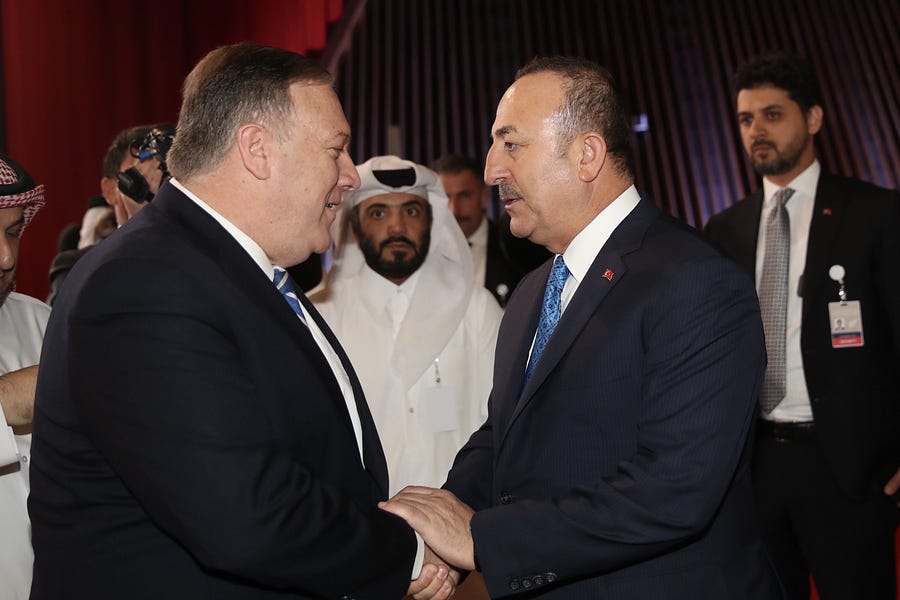After many months of negotiations, the United States and the Taliban have released the terms of an agreement designed to end the U.S. military presence in Afghanistan nearly two decades after the 9/11 attacks. The terms of deal, spelled out in a four-page document released Saturday and loaded with American concessions to our longtime jihadist foe, make clear that the agreement is less the “peace deal” that the Trump administration celebrated and more the “exit deal” that the Taliban had long demanded.
The concessions are significant. U.S troops begin a gradual withdrawal almost immediately, with the goal of a conditions-based “complete withdrawal of foreign forces” shortly after the U.S. election. The U.S. will lift its sanctions on Taliban leaders and promises to work on behalf of the Taliban at the United Nations to have international sanctions lifted, too. The language of the deal assumes that the current elected government of Afghanistan will be removed in order to make the new government more “representative,” meaning more Taliban-inclusive. And some 5,000 detained Taliban jihadists—ranging from low-level fighters all the way up to senior operatives—are set to be released as the work of putting together a post-withdrawal Afghan government begins in earnest.
Afghan President Ashraf Ghani, the elected leader of Afghanistan, objected to that last provision after the deal was released, given that these same Taliban fighters have spent years attempting to assassinate top Afghan government officials. “We have not made a commitment to release them. It’s a sovereign Afghan decision.” Ghani’s views were not represented in the talks, after the U.S. acceded to Taliban demands to exclude the current government from negotiations. The Taliban has long insisted the elected Afghan government is illegitimate.
The deal has required top Trump administration officials to back away from key claims made in the five months since President Trump canceled the meeting he’d planned with senior Taliban leaders at Camp David the week of the 18th anniversary of the 9/11 attacks. Just two weeks ago, Secretary of Defense Mark Esper declared: “Nobody right now is calling for the complete removal of US and coalition forces, U.S. forces will remain there as long as necessary to support our Afghan partners.” The agreement, however, declares: “The United States, its allies, and the Coalition will complete withdrawal of all remaining forces in Afghanistan within the remaining nine and a half (9.5) months.” The Taliban need not complete its obligations to bring about such a withdrawal; the agreement merely calls for the Taliban to provide “commitment and action on the obligations” of the deal.
In September, Secretary of State Mike Pompeo said that the U.S. had won “a commitment from the Taliban that said they would break from al-Qaeda publicly and permanently” before Trump cancelled the Camp David meeting. Such a promise, also demanded by the Bush and Obama administration negotiators, does not appear in the agreement released Saturday. Instead, the agreement declares simply that no “Taliban members, other individuals or groups, including al-Qaeda” will “use the soil of Afghanistan to threaten the security of the United States and its allies.”
There are two mentions of al-Qaeda in the four counterterrorism provisions of the document. They obligate the Taliban to prevent attacks that threaten U.S. security from Afghan soil, and to keep them from providing other assistance to al-Qaeda, passports, fundraising, etc. There is no public break from al-Qaeda, certainly no permanent public break.*
Pompeo, in an interview with Margaret Brennan on CBS’ Face the Nation on Sunday, nonetheless claimed that the Taliban “for the first time, have announced that they’re prepared to break with their historic ally, al-Qaeda.” Then he went further. Not only would the Taliban break with al-Qaeda, they would fight with Americans against their longtime ally. Pompeo told Brennan that a senior Taliban official promised that the Taliban “would work alongside of us to destroy, deny resources to and have al-Qaeda depart from that place.” Neither this promise nor the earlier one touted by Pompeo—a permanent and public Taliban break from al-Qaeda—appear anywhere in the agreement.
That’s not the most significant omission. There is no verification mechanism at all in the publicly released text of the deal. The agreement doesn’t require much of the Taliban and what it does require cannot be verified. The question for the Trump administration is a simple one: Did you sign an agreement with the Taliban without any verification mechanisms or are there additional parts of the deal you’re not releasing to the American public?
Rep. Liz Cheney, who has led a group of congressional Republicans skeptical of the deal, picked up on that point in a statement Saturday. “If verification mechanisms exist, the Secretary of State should immediately make them, and any other side deals or annexes, public. The American people deserve to know precisely what deals have been cut in our name with the terrorists who attacked us on 9/11.”
One last point: The final provision of the deal seems to hold open the possibility that U.S. taxpayers will help fund a government led by the Taliban. “The United States will seek economic cooperation for reconstruction with the new post-settlement Afghan Islamic government as determined by the intra-Afghan dialogue and negotiations and will not intervene in its internal affairs.”
After 19 years in Afghanistan, there are good reasons so many Americans want to leave. But it matters greatly how we leave. And the wrong way is to withdraw celebrating an agreement without enforcement mechanisms, that downplays the Taliban’s radicalism, elevates their position in Afghanistan, and even seems to leave open the possibility of U.S. taxpayer dollars for a Taliban-led government. That’s not a peace deal, it’s an exit deal. And it’s a bad one.
Photograph of Turkish Foreign Minister Mevlut Cavusoglu (right) and U.S. Secretary of State Mike Pompeoby by Fatih Aktas/Anadolu Agency via Getty Images.
Update, March 2, 2020: A paragraph describing how the deal between the United States and the Taliban covers the issue of the Taliban’s relationship with al-Qaeda was inadvertently left out at the time of publication. The piece has been updated.









Please note that we at The Dispatch hold ourselves, our work, and our commenters to a higher standard than other places on the internet. We welcome comments that foster genuine debate or discussion—including comments critical of us or our work—but responses that include ad hominem attacks on fellow Dispatch members or are intended to stoke fear and anger may be moderated.